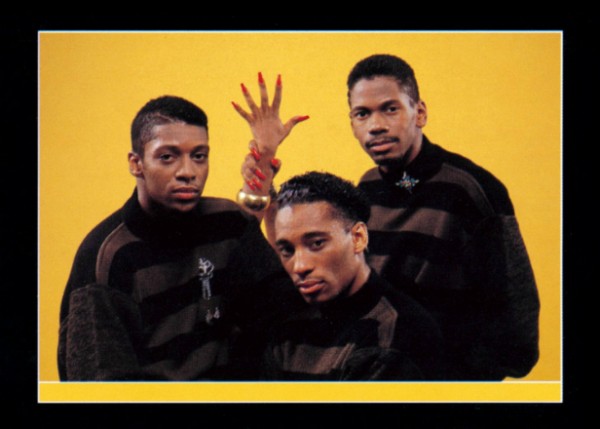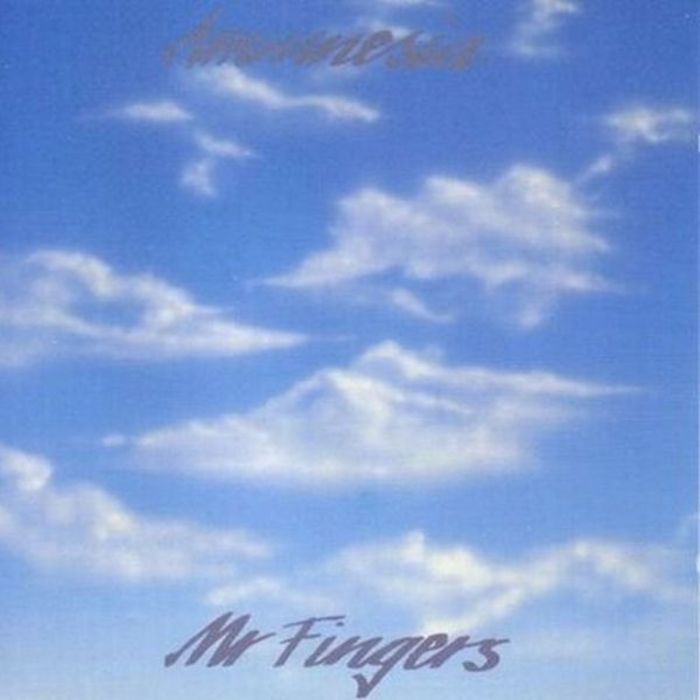Posted: September 17th, 2015 | Author: Finn | Filed under: Features | Tags: Electronic Beats, Fingers Inc., Larry Heard, Robert Owens, Ron Wilson | No Comments »

The early days of House Music in Chicago were dominated by enthusiastic young producers who processed what they heard being played by club DJs like Ron Hardy and Frankie Knuckles and radio DJs as the Hot Mix 5, a raw and highly functional take on the American Disco heritage and European electronic counterparts, its sound determined by limited means to afford musical equipment. There were many records released that had enough brilliant ideas to last to this day, but for its originators it might have been sufficient to have their tracks played by said DJs, and however addictive their rhythms and wild piano chords were, they also seemed not to aim too high in terms of traditional musicianship. Thus from very early on the music of Larry Heard stood out. He was a real musician, with credentials as a professional drummer and keyboard player, and he introduced a level of artistry to the scene that in comparison seemed to be underdeveloped until then. And from the start his music reflected his personality. It was deep, introvert, even melancholic. It did not contain the usual dancefloor imperatives, but it was still very danceable. But club functionality did not appear to be his top priority. Nevertheless all the records he released under different guises from the mid to late 80s became legendary classics, and many more records he released afterwards became legendary classics as well.
Consequently Larry Heard will forever remain one of the most revered artists in the history of House music, yet it always seemed as if he felt his career did not unfold as he hoped it would. He probably shared the same desire to become famous, just like the rest of the Windy City pioneers, but neither he nor his music were extrovert enough to fit the necessary schemes. And this both applied to his most noted alias Mr. Fingers, and Fingers Inc., the group he formed with Robert Owens and Ron Wilson. Mr. Fingers was reserved for his very own interpretations of the House groove, and he created one eternal blueprint after another in the process, impressively showing how deep and pure electronic music could be. Fingers Inc. on the other hand was clearly conveyed to work as a group, in the traditional sense of any other R&B group of those years, only with the sound of House instead of R&B. Just take a look at the pictures of the group on the sleeve, matching sweaters and confident poses, with female limbs wrapped around like an outtake from an Ohio Players artwork. The charts were to be climbed, the sooner and higher the better. But despite reassuring sales in the club scene they did not climb the charts as intended. It is significant that both the albums „Ammnesia“ by Mr. Fingers and „Another Side“ were released on the Jack Trax label from the UK, an imprint specializing on importing landmark Chicago House releases to the European market. Both albums combined tracks previously released on local Chicago House labels like Trax and DJ International with new material. Both albums were released in 1988, the year when a rising interest in the new dance sounds from across the pond turned into the Acid House movement that would change the UK and continental club scenes substantially. And both albums are not regarded as a quick compilation to cash in on a then current hype, they are regarded as peerless masterpieces. Albums that really work as albums, from start to finish, all killer no filler. They are still ultimate references that club music can work perfectly in the format, and whoever is failing is just not trying hard enough. So much for Larry Heard’s talents, you cannot really overestimate them. Read the rest of this entry »
Posted: October 21st, 2013 | Author: Finn | Filed under: Rezensionen | Tags: Groove, Larry Heard | No Comments »

Es ist bezeichnend, dass Larry Heard von den zahlreichen Plagiatsvorwürfen ausgespart blieb, mit denen sich die Chicago House-Pioniere nach den ersten Erfolgen gegenseitig überhäuften. Seine Musik war und blieb einzigartig. Es war offensichtlich, dass hier kein DJ mit schnellem Enthusiasmus Tracks zusammensetzte, die möglichst nächstes Wochenende das Warehouse oder die Music Box befeuern sollten. Hier hatte jemand eine Vision, die über die hektische Betriebsamkeit und die Effizienzprioritäten der Gründertage von House weit hinausging. Und es ist ebenso bezeichnend, dass dieses Album nur eine Zusammenstellung von vorher auf Singles veröffentlichten Tracks ist, und trotzdem ein ewiger Meilenstein geblieben ist, der bis heute als endgültige Referenz fortschwingt. Die fragile und reine Schönheit von Deep House-Prototypen wie „Can You Feel It“ und „Beyond The Stars“ ist nie wieder erreicht worden, und die psychedelische Rhythmik von „Washing Machine“oder „The Juice“ war auch schon dort, wo die anstehenden Wellen in Detroit, Chicago und überall sonst auf der Welt noch hinrollen würden. Blaupausen-Alert!
Groove 11/12 2013
Posted: February 9th, 2008 | Author: Finn | Filed under: Artikel | Tags: Andy Stott, Claro Intelecto, Club Transmediale, DJ Miles, Larry Heard, Moritz von Oswald, Murat Tepeli, Pendle Coven, Prosumer | No Comments »

Da muss schon etwas Gewichtigeres in die Speichen geworfen werden als die Bestreikung fast aller öffentlichen Verkehrsmittel, um die goldene Nacht der diesjährigen Transmediale ins Wanken zu bringen. Das Aufgebot war einfach zu opulent. Dementsprechend füllten sich die grieseligen Hallen der Maria sehr zusehends und früh schon kam Bewegung auf. Thematisch war die Nacht in zwei Teile gefaltet. Hüben Techno in Dub, drüben House. Für Ersteres zeichnete die Modern Love-Posse verantwortlich, die in voller Mannschaftsstärke erschienen war. Angefangen mit einem schönen Set vom wie immer fulminanten DJ Miles, später Pendle Coven, Andy Stott und Claro Intelecto an den Laptops. Es ist auffällig, dass sich alle Beteiligten so unisono in diesen raureifigen, aufgeräumten Labelsound einfügen. Das wird wirklich konsequent durchgezogen und mittlerweile auch deutlich ansteckender dargeboten als beim letzten Berliner Gastspiel in der Panoramabar. Der rechtmäßige Star auf diesem Floor war aber natürlich Moritz von Oswald, der, in Begleitung von Max Loderbauer an einem wunderschönen Modularungetüm und Vladislav Delay an sämtlicher Perkussion, wieder einmal vorführte, wie man diesen Sound wirklich intensiv macht. Es war beeindruckend, und eher im Stil seiner aktuelleren Remixe und Produktionen als an Basic Channel-Traditionsverwaltung. Da kommt hoffentlich noch mehr. Auf dem anderen Floor brachte Kalabrese mit seinem mitunter wirklich etwas rumpeligen Orchester das Unternehmen in Gang. Nicht so bewegend wie auf Tonträger aber mit reichlich Charme ausgeführt, und als der Grime-Look der Sängerin dann auch unverhofft auf Grime-Bass traf, gab es kein Halten mehr. Leider wurde der Zug mit einer nervtötend langen Umbauphase aufs Spiel angehalten, doch dann kam Larry Heard. Und man merkt, dass er sich jetzt auch immer mehr als DJ wohl fühlt. Anfangs noch sichtlich nervös begann er wie eine etwas wackelige Ausgabe einer guten Inner City-Nacht und wurde dann immer doller. Clivillés & Cole, der Percolator, sogar Plastic Dreams. Herrlich. Zum Abschluss dann „Can You Feel It“, mit einer improvisierten, wundervollen Darbietung des Gesangsparts von Robert Owens. Alle sind zu Tränen gerührt, Heard eingeschlossen. In diese Stimmung passen anschließend Prosumer, Murat Tepeli und Elif Bicer perfekt, da wird fürwahr ein Kreis geschlossen. Das kann alles immer noch sehr viel Spaß machen.
De:Bug Online 02/08

Posted: May 9th, 2005 | Author: Finn | Filed under: Artikel | Tags: de:bug, Interview, Larry Heard | No Comments »

Die Loosefingers EP tauchte in vielen Playlists vor allem wegen der beiden Acid-Tracks auf, die gerade gut in die gegenwärtigen Adaptionen des frühen Chicago-Sounds passen. War es Absicht, diesen als Reflektion deines Stils das ruhige Stück „When Summer Comes“ gegenüber zu stellen?
Ja. Das ist ein Stück, was eher auf lange Sicht angelegt ist. Das die Leute auch noch in Jahren hören und darüber nachdenken. Die Acid-Tracks sind da schon vordergründiger, aber ebenso wichtig. Mir macht das schon noch Spaß, mit Acid herumzuprobieren. Ich bin nach wie vor abenteuerlustig. Neulich habe ich mit einem Sänger herumgejammt, das klang wie ein bisschen wie Mick Hucknall oder Bono mit Acid-Sounds (lacht.). Über die Jahre hat sich einiges in diese Richtung angesammelt.
Es gibt also noch reichlich Reserven.
Ich habe hunderte derartiger Tracks gemacht. Es ist auch geplant, ähnliches Material als Loosefingers Album heraus zu bringen, welches dann auf Alleviated erscheinen soll. Read the rest of this entry »




Recent Comments